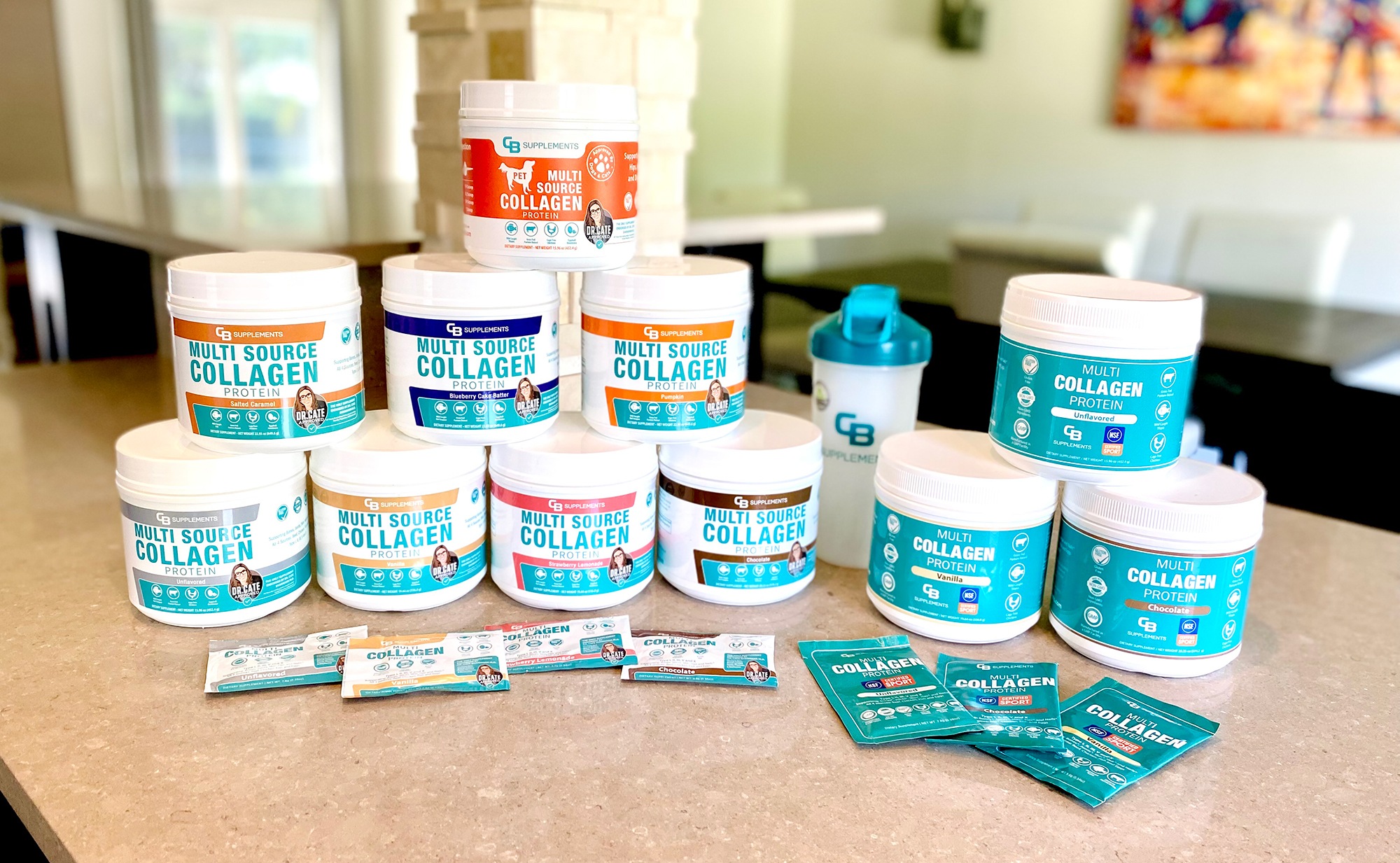Browse FAQs below or search Collagen College™ for something specific!
More results...
Basics of Collagen
Collagen is the most abundant protein found in the body, about 25-35% of whole body protein content. It is a main component of our connective tissue, many of our organs (including the heart, lungs and digestive system), our blood vessels, our bones and our joints.
We manufacture collagen from food we eat, however, around age 25-30 the production of collagen begins to slow down. Supplementing with collagen (or consuming the whole food form) can drastically improve many everyday functions and help restore overall health.
More ⇾ Collagen powder benefits or see our founder’s awesome collagen testimonial.
Collagen is absolutely a protein, making up 1/3 of our bodies total protein.
Collagen contains 19 amino acids, including 8 essential amino acids, missing the essential amino tryptophan. By definition, it is not a complete protein.
However, the reason for taking collagen is very specific. Its amino acids and bioactive peptides are unique to collagen and help optimize your body’s collagenous tissues.
There are at least 28 known types of collagen in the human body; however, almost 80-90% are Type I, Type II and Type III. Each type has a different function or supporting role in our body. See: 5 Types of Collagen
Collagen Peptides (also called Hydrolyzed Collagen), are short chains of amino acids derived from collagen. Collagen peptides are the more broken down form of collagen. This means that the protein is fully broken down, therefore making it more bio-available and ready to be easily absorbed.
Yes. Collagen peptides, hydrolyzed collagen, and collagen hydrolysate are the same — their names are interchangeable. Supplement companies have their choice on how they label their products, and the lack of uniformity can confuse consumers.
There are currently zero options for vegans to consume collagen protein. Less-strict vegetarians do have a few more options. See our Collagen Handbook for Vegans & Vegetarians.
A collagen supplement that claims to be a multi collagen means it's sourced from 2+ animals and contains all 5 types of collagen.
Collagen Safety
We have heard from very few customers (3 total over 3 years) that have some skin irritation or stomach irrational which is usually from the fish or egg collagen. And if this happens we are the company that will (and have) recommended the customer to buy a competitors’ product that is ONLY beef or chicken collagen. We just want people to be consuming more collagen, even if it isn’t ours!
Heavy metals in collagen peptides isn’t just a collagen problem, it’s a dietary supplement problem. Arsenic, cadmium, chromium, lead, and mercury are dangerous and can cause an array of health problems when consumed. You can avoid these heavy metals by ignoring faulty claims, reading labels, and verifying the collagen has passed third-party heavy metal testing.
Collagen is food!
Yes, taking a high quality collagen supplement is safe while pregnant and while nursing.
Absolutely collagen can be heated! Collagen comes from durable stuff, like bone. You can mix into hot liquids, cook with it, and microwave it without fear of losing its awesome nutritional value.
Since collagen is food, and most vitamins recommend taking with food anyway, yes it is safe to take a collagen supplement with vitamins!
Taking Collagen
Collagen is great for Adults, Athletes (especially CrossFitters), Kids & Teenagers, Seniors, and even Businesses who want to buy Collagen at Wholesale to help their customers live life to the fullest (e.g. Gyms, Chiropractors, Salons, Physical Rehabilitation Centers)
Anyone from the age of 2 and up can take collagen safely. More ⇾ What Age Should I Start Taking Collagen?
YES! Kids can (and should on our recommendation) have collagen every day. We recommend 1 serving per 50 pounds of body weight. And if the child is less than 50 pounds, a full serving is still great! More ⇾ Kids & Collagen: Benefits, Safety, Tips
We recommend 10g-40g of collagen per day. If collagen powder is your supplement of choice, that's 1 scoop of collagen powder per 50lb of body weight with a max of 4-5 scoops daily for best results.
More ⇾ How much collagen per day?
Anytime is a good time to take collagen. There is no evidence showing collagen is more effective taking it in the morning, evening, with vitamin C, or an empty stomach.
Our multi-collagen in unflavored and an easily dissolved powder that can be mixed with a number of different foods. It dissolves best in warm beverages or hot water, collagen peptides in coffee is very popular. Once diluted with hot water, it can be combined with any beverage of choice, just don’t mix with Coke. That kind of defeats the whole purpose. It can be used as a flour replacement in baking or added to any cooking dish as well. More ideas: How to take Collagen Peptides Powder.
Collagen is like brushing your teeth. Meaning, if you stop doing it you lose the health benefits. If you stop brushing your teeth, it is a matter of time that they will probably deteriorate from an overall health perspective. This is why we recommend consuming collagen from food or our supplement on a DAILY basis.
The short answer is, no. You need both collagen and whey! They have different benefits in the body. See: Collagen Protein vs Whey Protein
Collagen Supplements
Collagen is naturally found in organ meats and meat cooked on the bone, like a bone-in ribeye for example. Collagen can be made into a supplement through the processing of animal bone, joints, skin and even organs. These can come from any animal including cows, chickens, fish, pigs, dinosaurs, and even extracted from the membrane of egg shells.
See: What are Collagen Peptides Made of (And How is it Made?)
There are many pros, and a handful of cons, to taking a collagen supplement.
More ⇾ Pros and Cons of Collagen
So, our bias answer is powder. Cause that’s what we’re all about with our multi collagen protein powders.
Unbiased answer: collagen supplements come in 6 forms: Powder, Pills, Drinks, Bars, Shots, & Gummies.
YES, of course. As crazy as this sounds, we encourage you to get collagen from food first. Here are the foods that contain collagen.
This is a tricky answer. The simple answer is supplements have more collagen because they’re concentrated. However, food has more overall nutritional benefits because of all the other wonderful and important things (vitamins, minerals, bio-active compounds, etc.)
We believe there are 9 critical things to look for in collagen powder.
Collagen powder and pills have many similarities when it comes to effectiveness and absorption. However, they have major differences in grams of collagen per serving, cost, and consumption.
More: Collagen powder vs pills
In a flavored collagen supplement, you'll see the ingredient "natural flavors" listed. Natural Flavors means that the flavoring materials come from a constituent of the flavor itself.
Learn more: Ultimate Guide to Flavored Collagen Powder
Supplement companies will typically have their fish of choice that works well for their marine collagen.
We’ve seen the following fish used in collagen supplements: whitefish (cod, haddock, pollack), tilapia, and red snapper. We’ve even seen herring and mackerel. CB Supplements multi collagen peptides uses wild caught tilapia and cod.
Just like humans, our furry friends could use a collagen boost too! That’s why we introduced our Pet Collagen formula – specially flavored for our pets!
Learn more: Collagen for Dogs Guide


